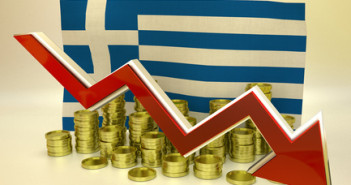With the stage set for a destructive Mexican stand-off in the Greek debt negotiations as the days in February flip by, Greece’s own ultimatum appears to have jolted the European Commission out of their steadfast position of extending the previously agreed upon terms. After Greek Defense Minister Pano Kammenos (also the leader of the Independent Greeks and the junior coalition partner of Syriza) stated that if Greece failed to get a revised debt agreement within the euro zone, it would have to secure funding from alternative sources, dropping hints those sources could be either Russia or China. Greece is seeking approximately €10bn to plug its short-term funding gap and will be proposing a plan at tomorrow’s emergency euro area finance minister meeting on how best to secure those funds. The current proposal suggests an increase of €8bn in the stock of Treasury Bills the country has access to, along with repurposing the nearly €2bn in profits euro zone central banks have made on their Greek debt holdings.
The threat of Russia or China providing the bridge financing Greece requires has enough weight that earlier this morning news crossed the wires that the European Commission would propose a six month extension for Greece, as it appears the political motivation for keeping any Russian or Chinese military bases out of Greece outweighs the troika’s need to save face in the debt negotiations. Equity futures and the euro popped higher on the news of potential progress in the discussions, though the early strength is beginning to fade as EURUSD slides back to pivot around the 1.13 handle.
In other overnight developments, China followed up their dreadful trade balance numbers with an inflation print that showed consumer prices dropped to a five year low by expanding by only 0.8% on a y/o/y basis, down from the 1.5% print registered in December and the slowest increase since November of 2009. The drastic tumble in the value of imports combined with the softer than expected inflation reading has stoked speculation that there will be at least another reserve ratio requirement cut from the PBoC to ease monetary policy and turnaround the slow start to 2015. The Shanghai Comp finished its session up by 1.49% amid the PBoC easing speculation, and while the aussie initially jumped along with Chinese equities, the rise in AUDUSD has been faded and the pair is chopping wood close to the 0.97 handle.
With the economic docket devoid of tier-one data until Thursday, market participants are keen to take their cues on market sentiment from developments in Greece and price action in commodities. The hydrocarbon complex is taking a breather this morning and is in danger of snapping its three day run of positive gains, despite bullish comments from the IEA who are forecasting the large build in oil inventories will start to fall as soon as mid-2015 with the market tightening substantially. The drop in front-month WTI back to the $52 area has given the big dollar a boost this morning, with the DXY making strides to the detriment of the aussie and loonie. USDCAD has been ambivalently stuck in a consolidative phase for the past few sessions, with the positive price action in energy diverting traders’ attention away from monetary policy considerations. At this point price action in the pair seems more conducive towards consolidation before another leg higher as opposed to a correction in the well-defined uptrend, though the fortunes of oil prices will play a big role in the direction of the loonie in the coming weeks.
Further reading:
EURUSD, GBPUSD, USDJPY Pivot Points, TA – Feb. 10 2015
EURUSD



